In a stunning abuse of power, State Rep. Barry Doss (R-Leoma) broke a long-standing rule of the Tennessee House of Representatives to ram an amended version of Gov. Haslam’s gas tax increase through the House Transportation Committee he chairs on Tuesday.
A bill containing the new and improved IMPROVE Act amendment, which restores many of the elements of Gov. Haslam’s original gas tax increase proposal, passed the House Transportation Committee in an 11 to 7 vote, but that outcome could not have taken place on Tuesday had not Chairman Doss broken Rule 34 of the Tennessee House of Representatives.
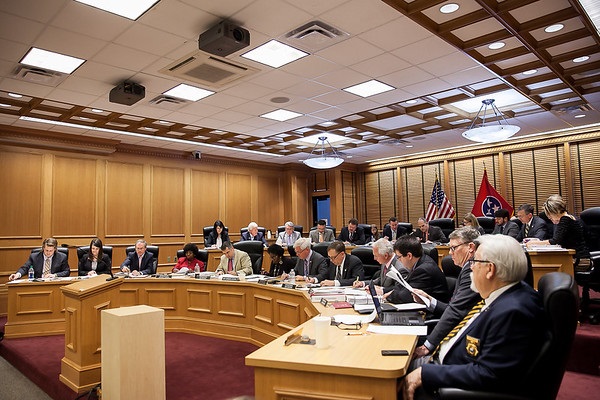
Rule 34 of the Tennessee House of Representatives allows any member the privilege of “separating the question” when an amendment is added to a bill that is up for consideration.
A key element of Rule 34–which is known to every member of the House–is that it is a “privilege” that can be exercised without question whenever a member invokes it in a committee hearing. It is not a “motion,” which is subject to a vote of the committee.
Every chairman of every committee in the Tennessee House of Representatives, including Rep. Doss, is well aware that Rule 34 is a privilege, not a motion, which cannot be subjected to a vote once it is invoked by a member.
With just a few minutes remaining in the House Transportation Committee meeting to vote on the amendment referred to by co-sponsor Rep. Bill Dunn (R-Knoxville) as the “new and improved IMPROVE Act,” Chairman Doss, who said he was “committed to get this vote out one way or the other,” broke the House rules to get the vote on the governor’s bill out.

“Pursuant to House Rule 34, I request that we divide the question, ” State Rep. Timothy Hill (R-Blountville) said after being recognized by Chairman Doss.
According to the Permanent Rules of Order of the Tennessee House of Representatives one Hundred Tenth General Assembly, Rule 34 states:
DIVISION OF QUESTION IN DEBATE. If the question in debate contains several points, any member may have the same divided; but no bill shall be divided on third and final consideration.
The latest version of the IMPROVE Act, which was approved by the Senate Transportation Committee on March 13, includes state tax increases for gas, diesel, liquefied gas and compressed natural gas, local government surcharges and increases the fees for motor vehicle registrations. The Act also contains reductions to the state portion of the sales tax on groceries and the franchise and excise tax, implements the phase in of Hall Income Tax elimination approved last year by the legislature and enhances the property tax relief program for low-income elderly and disabled homeowners.
Invoking Rule 34 would require that each of the separate topics be debated and voted on individually on their own merit, and afford each of the committee members a record of their votes.
After Rep. Hill called for Rule 34, Chairman Doss rotated his chair to conference with the research and legal analysts and clerks for several minutes, while Rep. Hill was called aside for a separate conference.
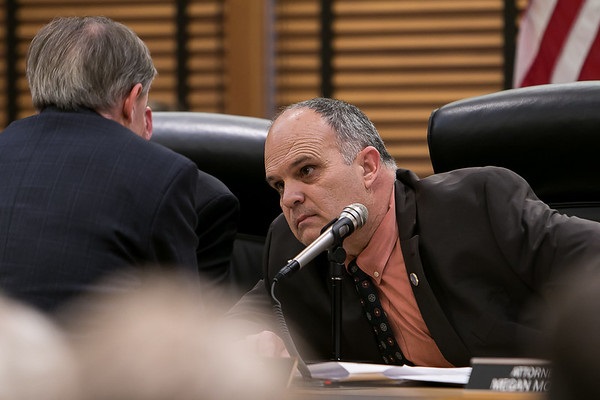
Rep. Hill’s motion was then seconded, but before Rep. Hill returned to his chair, Rep. Dunn conferenced with Chairman Doss. When Rep. Dunn returned to his chair and was recognized by Chairman Doss, Rep. Dunn said, “I’d like to move that motion to the table.”
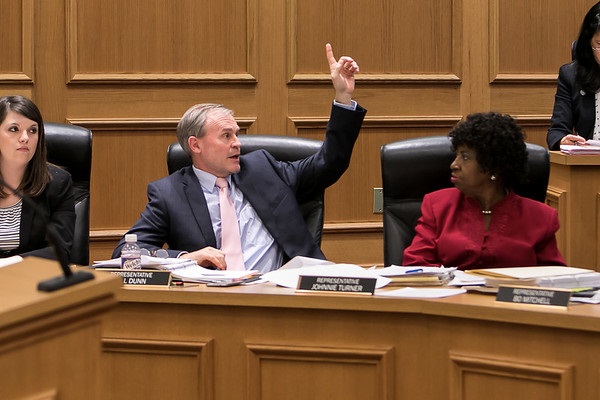
Chairman Doss, without asking if there was a second, proceeded directly to ask all those in favor say aye. With Chairman Doss being amplified by the use of his microphone, it was impossible to discern the ayes from the nays, but Chairman Doss gaveled, “Motion passes.”
Tennessee, like the majority of state legislatures, uses Mason’s Manual rather than Robert’s Rules of Order for procedural issues not specifically addressed in that body’s permanent rules of order. Mason’s Manual goes beyond the rules of order with court decisions, legislative precedents and the legal basis for the parliamentary procedures.
Robert’s Rules of Order addresses this particular issue in a similar manner.
“The purpose of the motion to Lay on the Table is to enable an assembly, by majority vote and without debate, to lay a pending question aside temporarily when something else of immediate urgency has arisen or when something else needs to be addressed before consideration of the pending question is resumed,” Robert’s Rules of Order states.
Robert’s Rules of Order further notes that an attempt to defeat something “by adopting a motion to table it . . . is a common violation of fair procedure. Such a motion is not in order, because it would permit debate to be suppressed by a majority vote, and only a two-thirds vote can do that.“
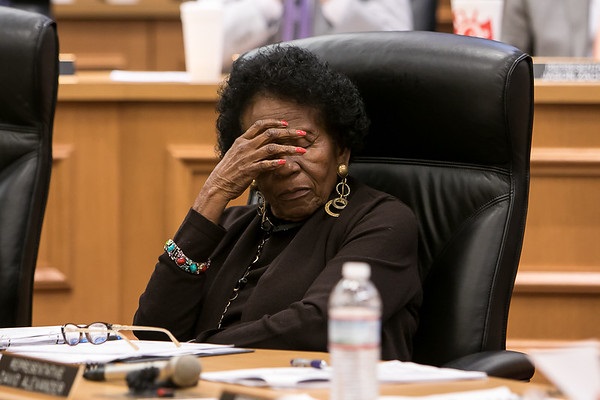
Fair procedure, however, was not on Chairman Doss’ agenda on Tuesday, as the opponents of Gov. Haslam’s gas tax increase on his committee soon discovered.
Rep. Hill responded immediately to the violation of fair procedure just executed by Chairman Doss and Rep. Dunn.
He raised his hand and spoke directly to Chairman Doss, who looked right at him.
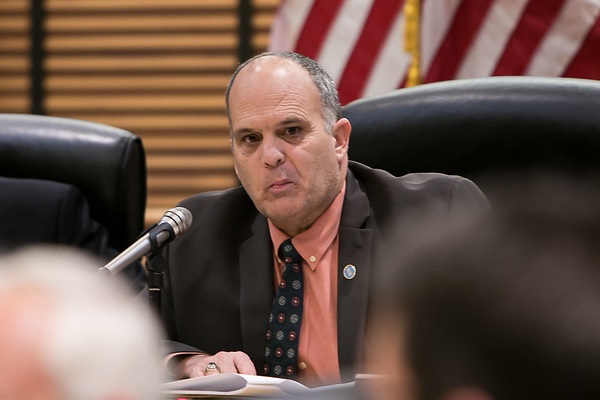
But, violating Rep. Hill’s privilege as a member of the Tennessee House of Representatives, Chairman Doss ignored Rep. Hill’s raised hand.
Boss Doss pushed on to accomplish his mission: to deliver House Transportation Committee passage of an amended version of the gas tax increasing IMPROVE Act to Gov. Haslam.
“Guys I know everyone’s getting tired and heated. We all knew when we started this committee we had a few minutes to go. We’re going to take a vote on this bill. If you want to vote no, vote no. If you want to vote yes, vote yes. But I’m committed to get this vote out one way or the other,” Doss said.
“A roll call has been called. We are on the amendment. Clerk, call the roll on the amendment.”
Rep. Courtney Rogers (R-Goodlettsville) called for a point of order.
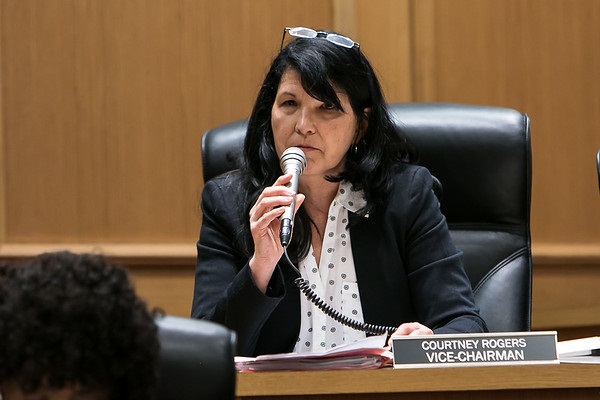
“Is there any way to get clarification since he had already made the move to divide?” she asked.
A point of order may be raised if the rules appear to have been broken and calls upon the chair to make a ruling. The chair may rule on the point of order or submit it to the judgment of the assembly.
Chairman Doss, did not properly address Rep. Rogers’ point of order, either.
Instead, he proceeded with his mission to ram the governor’s bill through the committee he chaired.
“Clerk, call the roll on the amendment,” he ordered.

The amendment passed with a vote of 10 to 8, and the bill containing the new and improved IMPROVE Act amendment passed with a vote of 11 to 7.
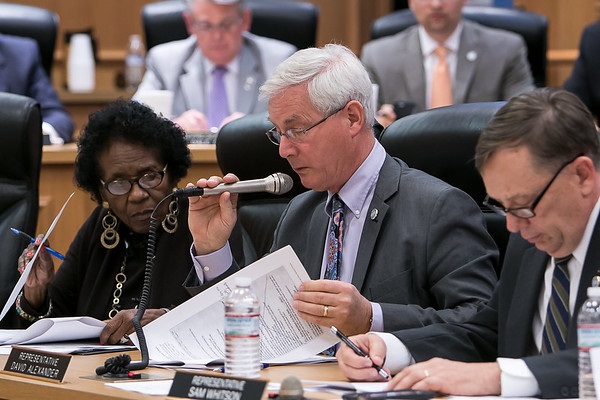
Representatives David Alexander (R-Winchester), Dale Carr (R-Sevierville), Barbara Cooper (D-Memphis), Barry Doss (R-Leoma), Bill Dunn (R-Knoxville), Kelly Keisling (R-Byrdstown), Bill Sanderson (R-Kenton), Eddie Smith (R-Knoxville), Ron Travis (R-Dayton), Johnnie Turner (R-Memphis), and Sam Whitson (R-Franklin) voted yes.

Representatives Timothy Hill (R-Blountville), Bo Mitchell (D-Nashville), Courtney Rogers (R-Goodlettsville), Jerry Sexton (R-Bean Station), Terri Lynn Weaver (R-Lancaster), John Mark Windle (D-Livingston) and Jason Zachary (R-Knoxville) voted no.
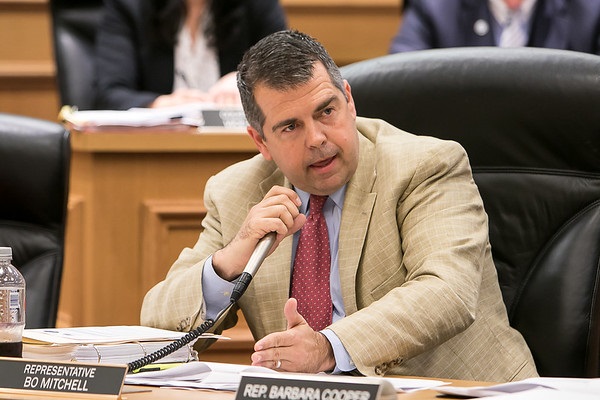
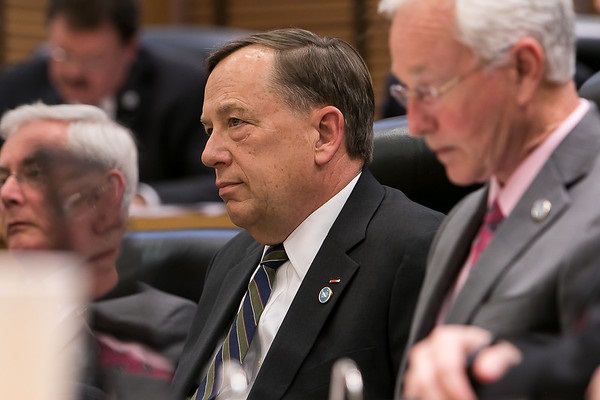

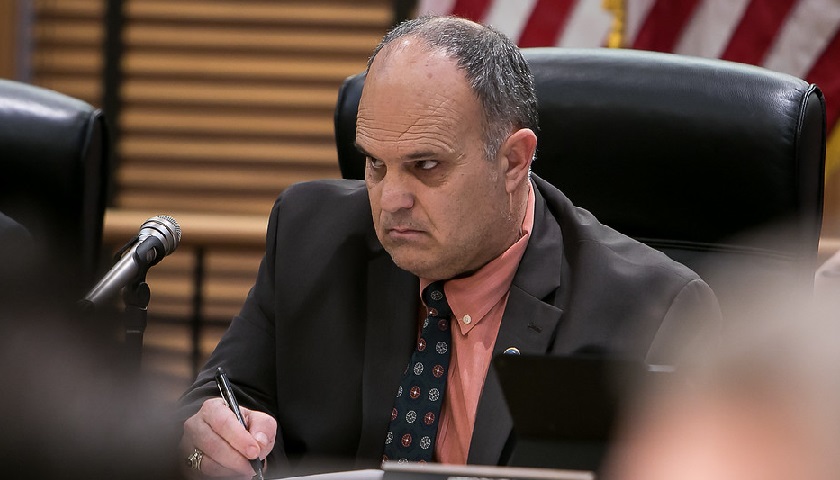
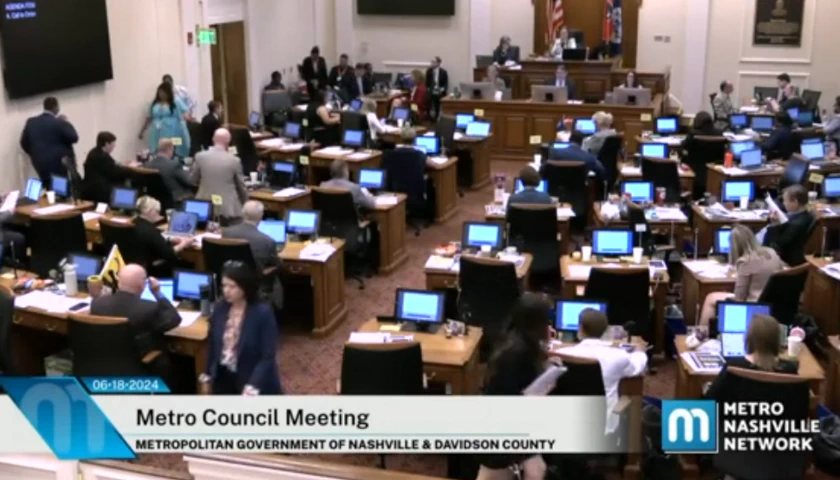

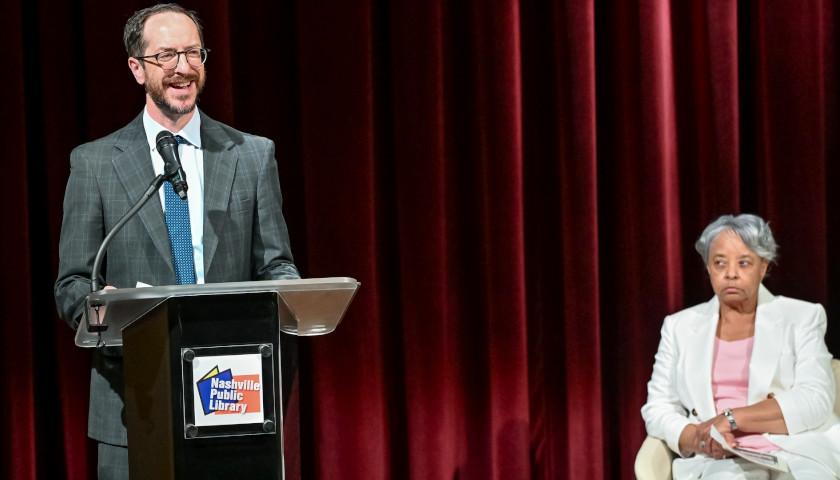
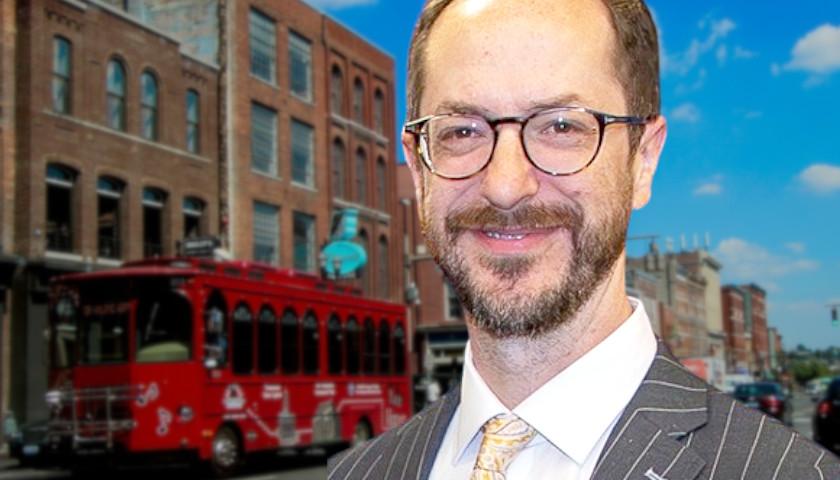
[…] conservatives in Tennessee have harshly criticized Haslam for introducing and forcing through the Tennessee General Assembly the Improve Act, which raised gasoline taxes by six cents per gallon and gave the twelve largest […]
[…] state legislator who broke the rules of the Tennessee House of Representatives to jam through Gov. Haslam’s gas tax increase in […]
[…] away in the bill that was rammed through the House Transportation Committee last March by State Rep. Barry “Boss” Doss (R-Leoma) was a provision that allowed […]
[…] Barry Doss’s role as champion of the IMPROVE Act, breaking rules and renaming it the Tax Cut Act of 2017, calls for an ethics investigation, and, subsequent to the […]
[…] Committee meeting, Chairman Doss, “committed to get this vote out one way or the other,” broke House rules to ram HB 534 through to its next stop at the House Local Government […]
[…] now, “La Raza Randy” joins “Boss Doss” in our list of favorite fact-anchored monikers, because public figures aren’t entitled […]
[…] apparently didn’t feel the need to address his breaking of House rules, presiding as committee chairman over a bill he sponsored, or other tactics he employed along the […]
[…] month, Boss Doss blatantly broke House rules to ram Gov. Haslam’s gas tax proposal – then known as the IMPROVE Act – through […]
[…] March 22, for instance, The Star published a story titled “Boss Doss Breaks Rules to Ram Amended Gas Tax Increase Through House Transportation […]
[…] March 22, for instance, The Star published a story titled “Boss Doss Breaks Rules to Ram Amended Gas Tax Increase Through House Transportation […]
R u done with Dunn ?
[…] increase through the House Transportation Committee he chairs on Tuesday,” The Tennessee Star reported last week in an article titled “Boss Doss Breaks Rules to Ram Amended Gas Tax Increase […]
[…] first link that Rep. Carr, having his amendment defeated, voted for Haslam’s tax increase. https://tennesseestar.com/2017/ 03/22/boss-doss-breaks-rules- to-ram-amended-gas-tax- increase-throug… https://tennesseestar.com/2017/ 03/23/state-rep-sam-whitson- is-proud-of-his-vote-to- […]
[…] passed the amended Senate version of the IMPROVE Act on an 11 to 7 vote, a result facilitated by Chairman Barry Doss (R-Leoma) breaking House rules to ram through the […]
[…] Rep. Sam Whitson (R-Franklin), one of the 11 members of the House Transportation Committee who voted yes on increasing the gas tax and moved the amended version of Gov. Haslam’s IMPROVE Act, tells […]
This is yet another in a long string of examples of why voice votes should be banned from the House. The Senate does not allow them. Neither should the House.
The only transparency in the TN Legislature is shenanigans and total disregard of its own rules of operation. I cannot believe what I’m hearing, reading and witnessing with my own eyes.
Brilliant piece of reporting! Few members of the public understand the procedural tricks and schemes played out here.